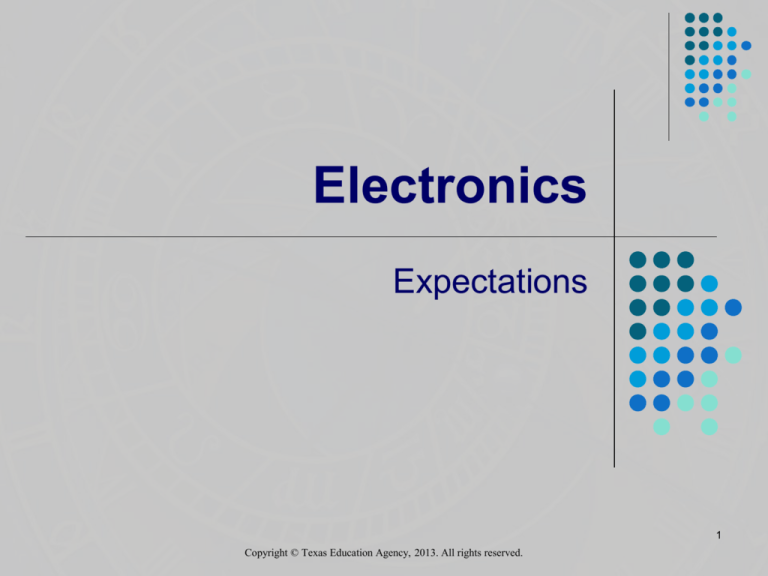
Electronics
Expectations
1
Copyright © Texas Education Agency, 2013. All rights reserved.
Expectations Overview
Terms and definitions
Reasons electronics field is a favorable field for
employment
The technical-industrial team
Places of employment opportunities for
electronics technicians
Contents of this course
Teacher and student responsibilities in the
electronics program
2
Copyright © Texas Education Agency, 2013. All rights reserved.
Terms and Definitions
A.
B.
C.
Electricity – An invisible force that can produce heat,
light, or motion by the movement of small particles of
matter called electrons
Electronics – The controlled use of electricity in
vacuum, gases, liquids, or vapors, and in certain
semiconductor materials
Automation - A system by which machinery or
electronic devices operate and regulate themselves
with little or no control by people
3
Copyright © Texas Education Agency, 2013. All rights reserved.
Terms and Definitions (cont’d)
D.
E.
F.
G.
Scientist – A person who studies the laws of nature in
order to learn how to control them for society’s
betterment
Engineer – A person who designs useful products on
the basis of scientific knowledge
Technician – A person who assists the scientist and
engineer in their work and helps design, build, install,
and maintain the products
Craftsworker – A person who is skilled in performing
some part of the building or fabrication of a product
4
Copyright © Texas Education Agency, 2013. All rights reserved.
Terms and Definitions (cont’d)
H.
I.
Federal Communications Commission (FCC) – A
United States government agency that regulates all
electronics communication within this country
Troubleshooting – A systematic method of locating
the cause of a problem or malfunction in electronic
equipment
5
Copyright © Texas Education Agency, 2013. All rights reserved.
Why learn electronics?
Because it explains how things actually work
Electronic devices are made from electronic
components.
These components have capabilities and
limitations.
You learn how to fix things (it’s practical)
You learn problem solving and troubleshooting
skills.
You develop mechanical aptitude by working with
your hands.
6
Copyright © Texas Education Agency, 2013. All rights reserved.
Why learn electronics? (cont’d)
Electronics is a practical application of math and
physics (science)
You learn math and science better by applying it.
It provides a foundation for engineering and other
technical fields.
You will be considered smart.
Most important:
It’s fun and exciting!
7
Copyright © Texas Education Agency, 2013. All rights reserved.
Reasons electronics field is a
favorable field for employment:
1.
New types of electronic equipment are
constantly being developed for industry.
2.
Consumers are buying more electronic devices
and appliances for use at home and work.
3.
Present technicians are continuously retiring.
4.
There are opportunities for self-employment.
5.
Many jobs require electronics as a foundation.
8
Copyright © Texas Education Agency, 2013. All rights reserved.
The Technical-Industrial Team
9
Copyright © Texas Education Agency, 2013. All rights reserved.
The Technical-Industrial Team
10
Copyright © Texas Education Agency, 2013. All rights reserved.
Scientist or Engineer
1.
Work is about 90%
theoretical, 10% skill
2.
Typical activities-
research, development,
planning, design,
invention, and
publication of results
3.
Education required Four or more years of
college (BS, MS, or PhD)
11
Copyright © Texas Education Agency, 2013. All rights reserved.
Engineering Technician
1.
2.
3.
Work is about 60% theoretical,
40% skill
Typical activities
a. Assist in design, and
system planning
b. Operate, modify,
troubleshoot, and
repair equipment
c. Record and report
results
Education required – Two to
four years post-secondary school
or junior/senior college
12
Copyright © Texas Education Agency, 2013. All rights reserved.
Industrial Technician
1.
2.
3.
Work is about 40% theoretical,
60% skill
Typical activities
a. Machine operation
b. Preventive maintenance
c. Troubleshooting and
repair of equipment
Education required - Two
years post secondary school or
junior college
13
Copyright © Texas Education Agency, 2013. All rights reserved.
Service Technician and
Craftsworker
1.
2.
3.
Work is about 10%
theoretical, 90% skill
Typical activities
a. Equipment servicing
and limited repair
b. Hand and machine
tool operation
Education required High school or vocational
school; some postsecondary schooling or
journeymen’s program
14
Copyright © Texas Education Agency, 2013. All rights reserved.
Contents of This Course
Basic studies
A.
(NOTE: These are covered early in this course.)
1.
2.
Safety
The laws which govern electricity
Examples: Ohm’s law, Kirchhoff’s law, Watt’s law
3.
Leadership fundamentals
Example: speech, parliamentary procedure
4.
5.
6.
7.
The sources of electricity and magnetism
Industry contests: SkillsUSA, MATE, FIRST, BEST
How electricity behaves under certain conditions
How electricity is used in our daily lives
15
Copyright © Texas Education Agency, 2013. All rights reserved.
Contents of This Course
(cont’d)
Advanced studies
B.
(NOTE: The following are studied later in the course.)
1.
2.
3.
4.
5.
The fundamentals of electronic circuitry
The nature and use of electronic components
Examples: Resistors, capacitors, inductors, and
active devices
The function of components in electronic systems,
such as radio, television, radar, and solar
How to test, troubleshoot, and repair electronic
components and systems
Compete in a trade or leadership skill at district, state
or national level contest
16
Copyright © Texas Education Agency, 2013. All rights reserved.
Contents of This Course
(cont’d)
C.
Laboratory work
(NOTE: Laboratory work will occur throughout the
course)
1.
How to use test and measuring equipment
2.
How to build electronic circuits and connectors
3.
How to draw and read schematic, block diagrams
and wiring diagrams of electronic circuits
4.
How to test, troubleshoot, and repair circuits
17
Copyright © Texas Education Agency, 2013. All rights reserved.
Teacher’s
Responsibilities:
•
•
•
•
Supervise the classroom
Provide for student’s needs
Make sure safety is
practiced in the lab
Require students to follow
directions
18
Copyright © Texas Education Agency, 2013. All rights reserved.
Student’s
Responsibilities:
Follow safety rules and lab
regulations without exception.
Attend class regularly and on
time.
Follow directions exactly.
Ask for help when needed.
Refrain from causing
distractions.
Never perform an operation
which is not understood.
Complete assigned work
without being reminded.
Have pride and enthusiasm in
work.
19
Copyright © Texas Education Agency, 2013. All rights reserved.
To expect something is to look forward to its
probable occurrence or appearance.
Bring required materials to class every day!!!
Required materials include:
1.
2.
3.
4.
Pencils only. No work is to be done in pen!
Scientific calculator
A three-ring binder with paper and a section for math
Classroom file folder to hold student work
Follow directions the first time given.
Use the bathroom, go to your locker, and sharpen your pencil DURING
THE PASSING PERIOD.
After an absence, it is the student’s responsibility to find out what work
was missed and arrange for the make-up work.
1.
2.
3.
Daily attendance is necessary if you expect to do well in this class.
Often, you cannot make-up material you missed by reading the book.
Attendance problems will be handled on a one-on-one basis.
Copyright © Texas Education Agency, 2013. All rights reserved.
20








